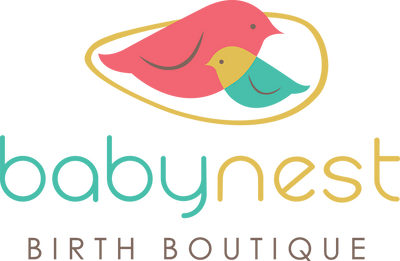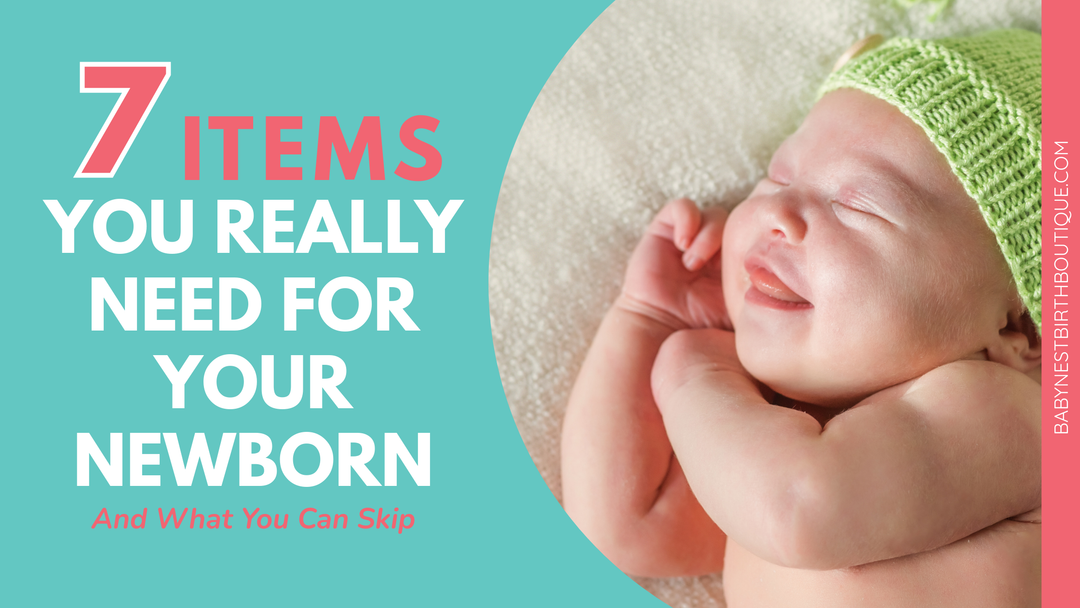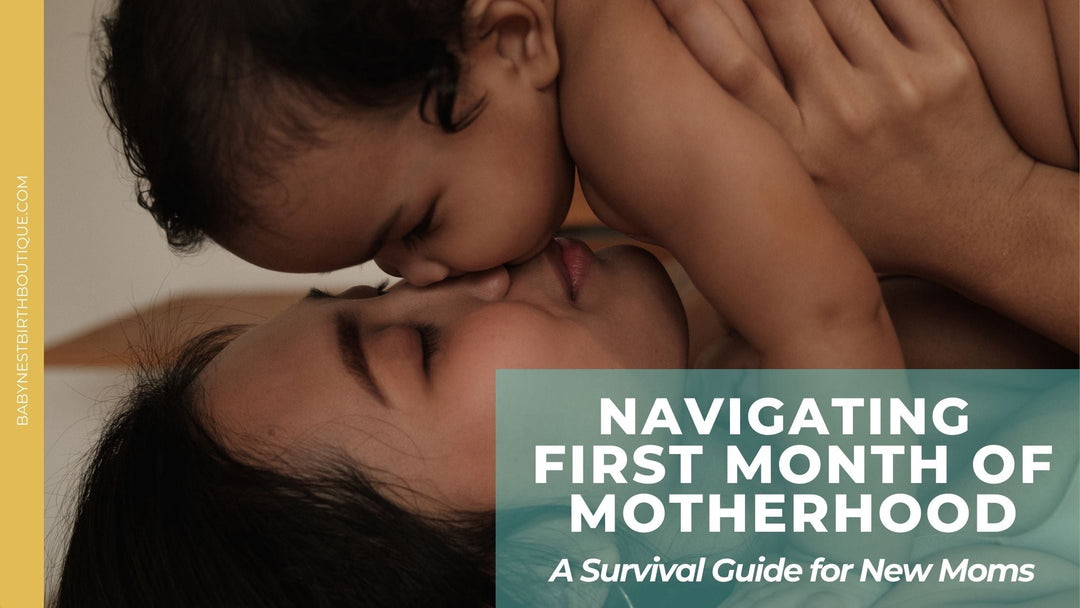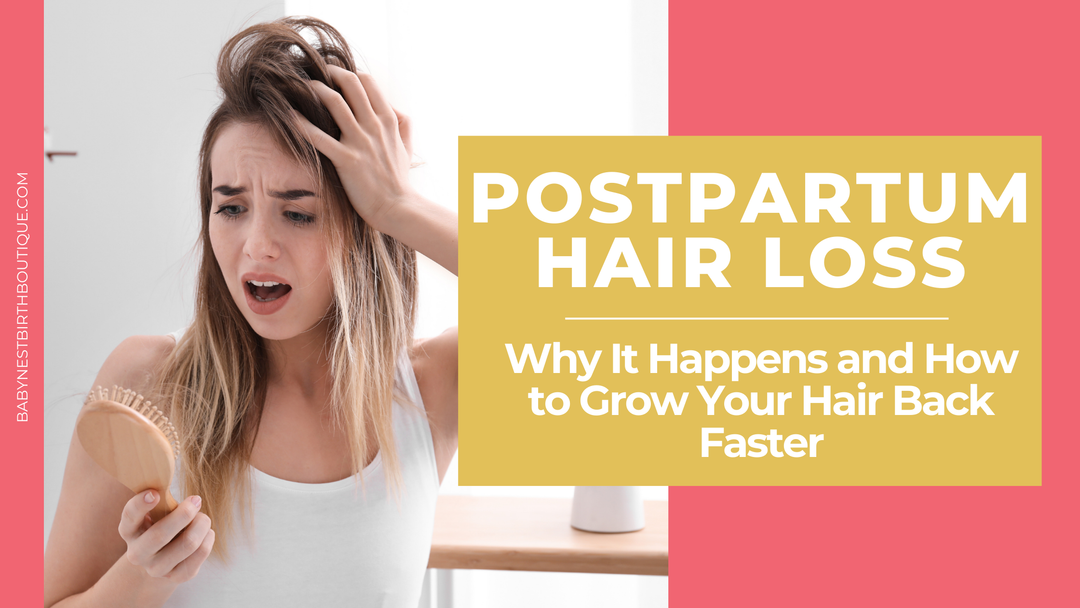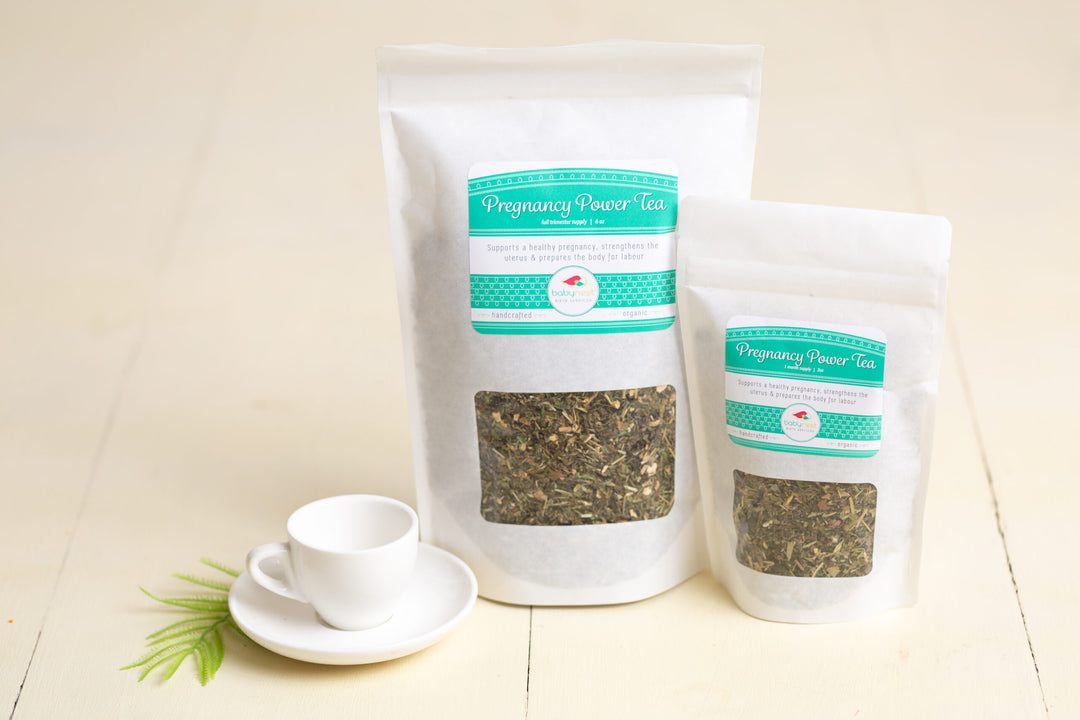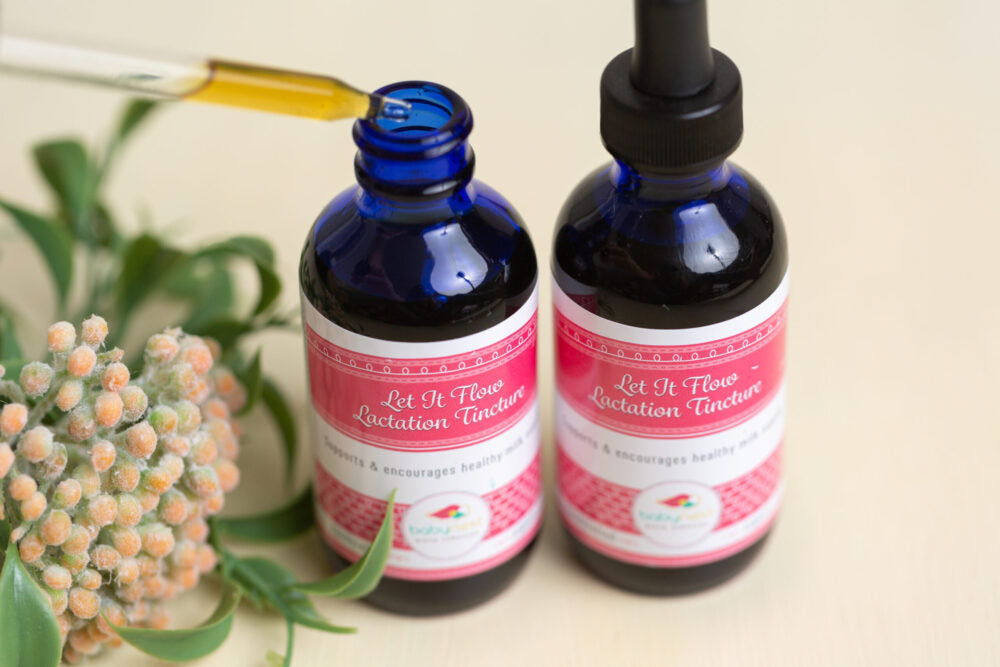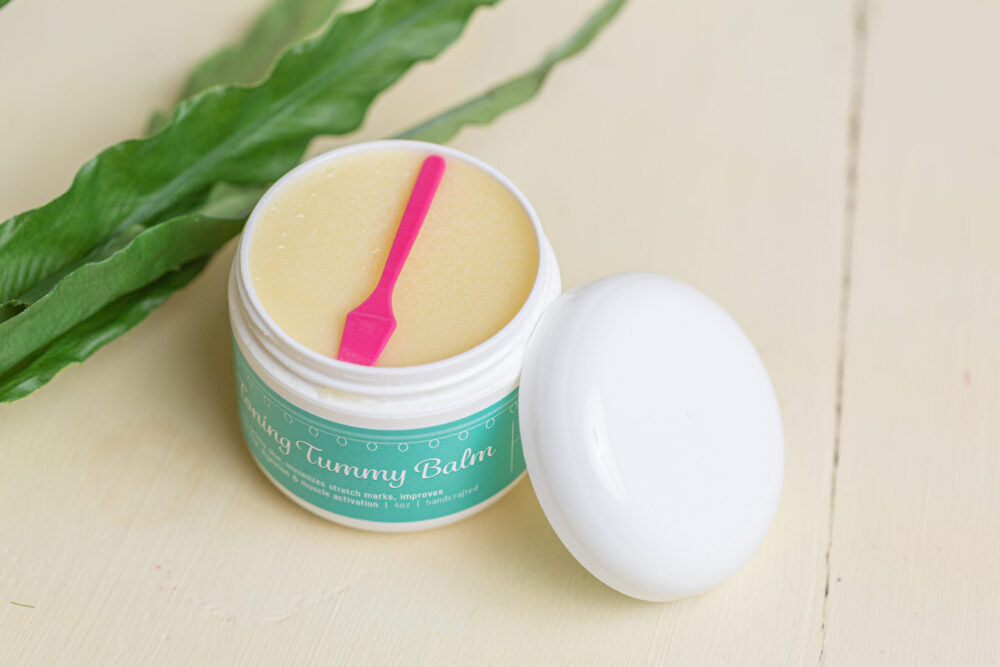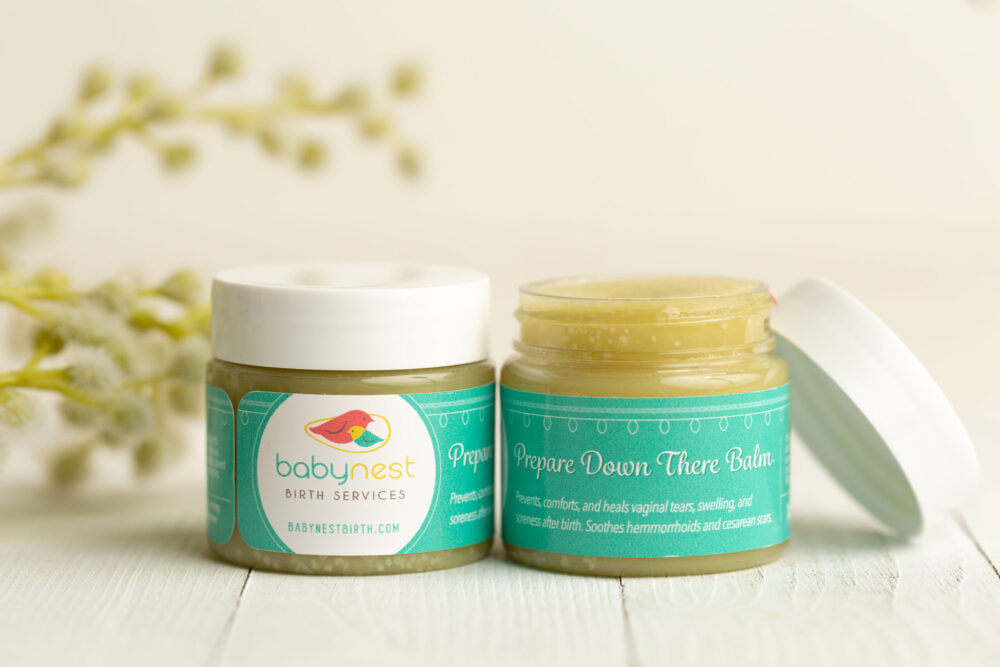Postpartum Hair Loss: Why It Happens and How to Grow Your Hair Back Faster
Hey mama, let’s talk about something that no one warned us about (and honestly, they should have): postpartum hair loss.
Yup, those extra strands in the shower drain and on your baby's onesies? Totally normal. And no, you’re not going bald (even though it feels that way). This shedding phase is part of your body’s recovery after birth.
So, grab that coffee and let’s dive into why postpartum hair loss happens and how you can reduce it and get back to that bodacious head of hair.
So... What’s the Deal with Postpartum Hair Loss?

Remember that thick, goddess-like hair you rocked during pregnancy? Yeah, that wasn’t magic (even though it felt like it). It was thanks to sky-high estrogen levels, which kept your hair in the growth phase (a.k.a. anagen phase) longer than usual.
But after the baby arrives, hormone levels crash, and your hair shifts into the shedding phase or the telogen effluvium. It’s basically your body’s way of saying, “Okay, party’s over. Time to clean house.”
Most mamas start noticing this around 3-4 months postpartum, and it can last up to a year. Fun times, right?
How to Stop Postpartum Hair Loss (or At Least Slow It Down)

Loosing clumps of hair after having a baby? Don't panic - it's totally normal and temporary. The culprit? Those lovely hormonal shifts that comes after pregnancy. But the good news? There are ways to slow the shedding and help your hair make a fabulous comeback.
1. Nourish Your Body with Nutrients

We're not saying you should demolish an entire pepperoni pizza when labor kicks in (though no judgment if you do), but nourishing your body is key to bouncing back—and that includes your hair.
Why nutrition matters: Your hair thrives on vitamins and minerals, so loading up on the right nutrients can help slow the shedding and speed up regrowth.
-
Protein & Iron: Your hair is made of keratin (a protein), so fill your plate with lean meats, fish, eggs, legumes, and nuts. Plus, iron fights off anemia, which can worsen hair loss.
-
Biotin & Collagen: Biotin strengthens hair, while collagen boosts elasticity. Think eggs, sweet potatoes, and a scoop of collagen powder in your smoothie.
-
Omega-3 Fatty Acids: Found in salmon, flaxseeds, and walnuts, these nourish your hair follicles and keep your scalp healthy.
- Vitamin D & Zinc: A lack of these can lead to thinning hair. Get some sunlight and stock up on dairy, seeds, and leafy greens.
Pro Tip: Good nutrition doesn’t just help your hair—it boosts your milk supply too! If you're prepping for breastfeeding, check out our Prepare for Breastfeeding During Pregnancy blog. And for an extra milk-boosting, hair-loving superpower, add our Let It Flow Lactation Tincture to your daily routine.
2. Be Gentle with Your Hair

Your hair is already going through a natural shedding phase, so the last thing it needs is added stress from harsh styling habits. Treat your hair with extra care to prevent further breakage and promote regrowth:
-
Loosen up those mom buns: We know the messy bun is a postpartum staple, but tight hairstyles can tug on already fragile hair. Opt for loose braids or a soft scrunchie to reduce tension on your scalp.
-
Switch to a wide-tooth comb: Your hair is more prone to breakage right now, especially when wet. A wide-tooth comb gently detangles without causing damage.
-
Use a sulfate-free, volumizing shampoo: Harsh shampoos can strip your scalp of natural oils, making hair more brittle. Look for nourishing, sulfate-free options that add volume and keep your scalp healthy.
-
Limit heat styling and chemicals: We get it—sometimes you just want to feel put together. But excessive heat and chemical treatments can weaken hair strands. Embrace air-drying or try heat-free styles like braids or twists to give your hair a break.
Your hair is in recovery mode, mama. A little extra TLC will go a long way in supporting growth and reducing excess shedding.
3. Scalp Care & Massage

Your scalp is the foundation for healthy hair growth, so giving it a little extra love can help stimulate hair follicles and encourage regrowth during the postpartum shedding phase:
-
Massage with essential oils: Gently massaging your scalp with oils like rosemary or castor oil can improve blood circulation, nourish the hair follicles, and promote healthier, stronger hair. Try doing this for a few minutes before showering or as part of your nighttime self-care routine.
-
Use Castor Oil: Its known benefits include increasing blood flow to the scalp, which promotes healthier hair. Some studies have shown applying castor oil once a month can boost hair growth up to five times the usual rate. Castor oil can be very sticky and hard to remove, so we love this one designed for the hair.
-
Exfoliate to remove buildup: Just like your skin, your scalp can accumulate product buildup and dead skin cells, which can clog hair follicles and slow down growth. Use a gentle scalp scrub or a soft-bristled brush to exfoliate once a week and create the perfect environment for new hair to thrive.
Taking care of your scalp not only supports hair regrowth but can also be a relaxing way to unwind during those busy postpartum days.
4. Stay Hydrated & Manage Stress

So we want to reduce our postpartum hair loss? Then let's also talk about two secret weapons for keeping that gorgeous mane of yours: water & chill vibes.
-
Hydrate like a queen: Your hair needs hydration from the inside out, and guess what? Your morning iced coffee doesn’t count (sorry!). Sip on water throughout the day—think of it as giving your hair a refreshing drink to keep it strong and shiny. Bonus: It helps with that postpartum glow, too.
-
Stress less, shed less: We know, we know... "Just relax" is the worst advice ever when you’ve got a newborn who thinks sleep is optional. But hear us out: Sneak in some deep breathing while baby naps, try a quick yoga stretch, or do a 5-minute guided meditation (thank you, YouTube!). Trust us, your hair will thank you for those zen vibes.
Need extra support for those anxious moments? Check out our blog on Practical Strategies for Easing Postpartum Anxiety for tips on calming your nervous system and finding your peace.
Tiny changes, big results. You’ve got this, mama!
Pro tip: Supporting your body's recovery from the inside out is key. Using products like our Toning Tummy Balm can help soothe your body and promote postpartum healing and reduce stress.

5. Continue Prenatal Vitamins
Don’t toss those prenatal vitamins just yet!
Why stick with them? Your body is still in recovery mode after growing a tiny human, and those vitamins are packed with the nutrients your hair (and body) need to thrive. Think biotin, iron, and folic acid—all the good stuff that supports hair growth and prevents excess shedding.

Pro tip: Hate taking vitamins? Our female-focused tea covers many of the essential vitamins and minerals that are in a prenatal. For moms that can't take pills, many midwives recommend drinking this tea daily to cover your bases. BUY TEA HERE!
7. Consider Hormonal Balance with Placenta Pills

Moms who encapsulate their placenta, do report less hair loss after having a baby than those that don't use placenta pills. This would be coming from the belief that the placenta contains nutrients and hormones that can benefit the mother during the postpartum period.
What are placenta pills? Placenta encapsulation is the process of deyhydrating the placenta and using it as a natural medicine for your postpartum - your bioidentical hormone!
Since the placenta is chocked full of hormones, moms who encapsulates her placenta have more hormones available to her, thus reducing more hair loss.
From the Portland, OR metro area and would like to reserve your due date for placenta services - START HERE!
When to See a Doctor

If your hair seems to be falling out like confetti at a birthday party (but way less fun), it might be time to dig a little deeper.
What’s going on? While postpartum hair loss is totally normal, shedding that lingers beyond six months could be a sign of something else—like a thyroid imbalance or other hormonal hiccups.
What to do: Don’t hesitate to chat with your healthcare provider. They can run tests and help you figure out if your hormones need a little extra support.
Remember, your body just did something incredible, and sometimes it needs a little extra TLC to bounce back. You’ve got this!
While postpartum shedding is totally normal, if you’re losing clumps of hair or noticing bald patches, it might be worth checking in with your doctor. Sometimes, underlying issues like thyroid imbalances or nutrient deficiencies can contribute to excessive hair loss.
Final Thoughts, Mama... This is Temporary

We get it—watching your hair fall out feels like adding insult to injury when you're already sleep-deprived and covered in baby spit-up.
But your body is healing. Your hormones are balancing. And your hair will grow back.
In the meantime, rock that messy bun, own those baby hairs, and remember—you’re doing an incredible job.
Feeling Overwhelmed in Motherhood?
You're not alone, mama. For more support in navigating those early weeks with your little one, check out our Navigating Your First Month of Motherhood: A Survival Guide for New Moms.
